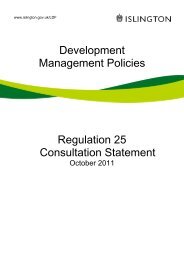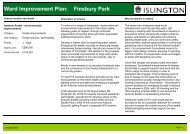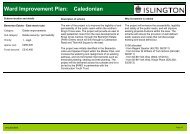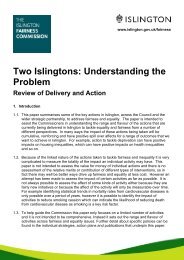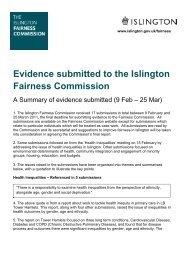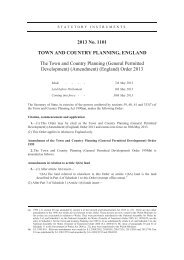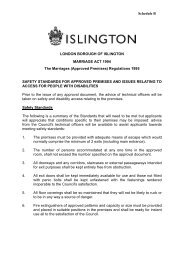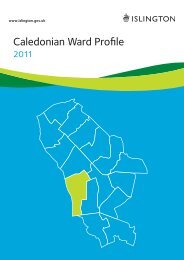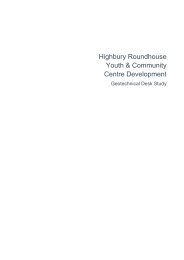Local Authority Support to People with No ... - Islington Council
Local Authority Support to People with No ... - Islington Council
Local Authority Support to People with No ... - Islington Council
You also want an ePaper? Increase the reach of your titles
YUMPU automatically turns print PDFs into web optimized ePapers that Google loves.
have overstayed their visas, have submitted an Article 8 ECHR application <strong>to</strong> the Home Office and<br />
are homeless. Case law has established that in such circumstances there is likely <strong>to</strong> be a duty on<br />
local authorities <strong>to</strong> support these families under Section 17 Children Act 1989 1 and this can go on for<br />
years whilst a decision is being made by the UKBA on their immigration claim.<br />
The report makes several recommendations <strong>to</strong> the UKBA, including: families who have overstayed<br />
their visa <strong>with</strong> outstanding Article 8 ECHR applications should be eligible for Section 4 Immigration<br />
and Asylum Act support from the UKBA. This would give the UKBA a greater incentive <strong>to</strong> make<br />
quicker and more timely decisions on these cases. The UKBA should make it official policy <strong>to</strong><br />
prioritise local authority-supported cases in the same way as cases who receive asylum support; and<br />
they must ensure an effective start-<strong>to</strong>-end process by funding voluntary returns and carrying out<br />
enforced removals where appropriate.<br />
<strong>Local</strong> authorities are advised <strong>to</strong> record, moni<strong>to</strong>r and review their NRPF cases. Policies and<br />
procedures <strong>with</strong>in local authorities should be developed <strong>to</strong> ensure statu<strong>to</strong>ry duties <strong>to</strong> people <strong>with</strong><br />
NRPF are met. A coordinated approach is needed across local authority departments and locality<br />
teams, and between local authorities and external organisations <strong>to</strong> facilitate the resolution of NRPF<br />
cases.<br />
The report ‘Social Services <strong>Support</strong> <strong>to</strong> <strong>People</strong> <strong>with</strong> <strong>No</strong> Recourse <strong>to</strong> Public Funds: A National Picture’<br />
can be accessed on the NPRF Network website:<br />
http://www.isling<strong>to</strong>n.gov.uk/DownloadableDocuments/CommunityandLiving/Pdf/equalitydocs/NRPF_<br />
national_picture_final.pdf<br />
The slides from this presentation are available on the following webpage:<br />
http://www.isling<strong>to</strong>n.gov.uk/community/equalitydiversity/refugees_migrants/nrpf_network/events.asp<br />
Hugo Tristram – Development Officer, Refugee Services, British<br />
Red Cross<br />
Hugo summarised the findings and recommendations from the 2010 British Red Cross Report ‘<strong>No</strong>t<br />
gone, but forgotten’. The report is based on a survey of 101 destitute refused asylum seekers. The<br />
report argues that there is an urgent need for a more humane asylum system in the UK.<br />
Specific ‘client groups’ identified in the report include: refused asylum seekers, new refugees<br />
(becoming destitute when support is <strong>with</strong>drawn after 28 days of a positive decision), those<br />
experiencing bureaucratic delay in accessing asylum support and other vulnerable migrants <strong>with</strong><br />
NRPF such as victims of trafficking or domestic violence. Impacts of destitution include poor physical<br />
health and malnutrition, homelessness and ‘sofa surfing’ (69%), vulnerability <strong>to</strong> abuse and severe<br />
anxiety from living in limbo.<br />
Hugo explained that Section 4 support is not sufficient for families and children (who comprised 24%<br />
of cases in the sample) because of the level of support provided and because it is administered in<br />
vouchers rather than cash.<br />
Hugo discussed the issue of destitution arising as a product of the asylum system and what local<br />
authorities and the voluntary sec<strong>to</strong>r can offer <strong>to</strong> people in this situation, particularly when legal aid is<br />
diminishing. He argued that a start-<strong>to</strong>-end asylum support process was needed, that asylum seekers<br />
1 Clue v Birmingham City <strong>Council</strong> [2010]<br />
NRPF Network/British Red Cross Conference Report June 2011 6



